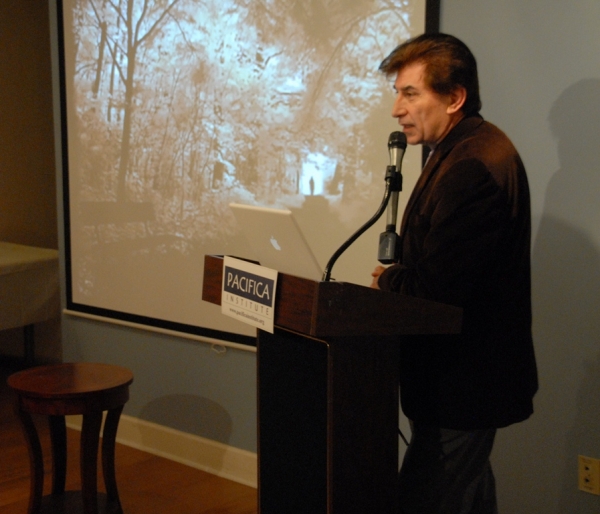Pacifica Institute hosted a Sufi Night on December 17th, 2011 on the occasion of Shab-e-Aruz, the Night of Union, of the legendary Sufi poet, Rumi.
Sufi Night 2011 (December 17, 2011)
On the occasion of Rumi’s Shab-e-Aruz (Night of Union) we at Pacifica Institute hosted a Sufi Night. The Night was opened by Mr. Ozgur Koca, a PhD candidate at Claremont Graduate University. Mr. Koca talked about the importance of Shab-e-Aruz and explained the connection of Pacifica Institute to Mevlana Rumi.
The name Mawlana Jalaluddin Rumi stands for Love and ecstatic flight into the infinite. Rumi is one of the greatest spiritual and literary figures and was the founder of the Mawlawi Sufi Order. He was born in Wakhsh, under the administration of Balkh (modern day Afghanistan) in September 30, 1207 to a family of learned theologians.
His father Baha’ al-Din Walad (Bahauddin), was a religious scholar and Sufi who with the advent of Mongol invasion of Central Asia took his family westward, visiting Damascus and Naishapur on the way to the Hijaz. Here, the young Jalal al-Din (Jalaladdin) met and received the blessing of Farid al-Din (Fariduddin) Attar, the outstanding Sufi poet of the day, whom he was to succeed in the annals of Persian Sufi poetry. He is reported to have said, as he saw Bahauddin walking toward him with the young Rumi a little behind, “Here comes a sea, followed by an ocean!” . The family made the pilgrimage to Mecca and then set out northward to Anatolia and settled down in the city of Konya, Turkey. It was here that Rumi was to spent his forty-some years of his life, where he composed his peerless works, and where he received the inspiration for sacred music and dervishes. Rumi became like his father, a religious scholar and mastered the sciences of his day. He was also initiated into the mysteries of Sufism. But it was the meeting with the mysterious Sufi, Shams al-Din Tabrizi (Shams), that set his soul on fire and turned him into an incomparable poet of Divine Love and Illumination.
Rumi composed his Mathnawi and Divan-i Shams, the monumental works devoted to gnosis and divine ecstasy, following the encounter with Shams which changed the literary and spiritual landscape of Persian and Turkish worlds. Rumi was not a poet who happened to practice Sufism, but great Sufi master the rhythms of whose soul were expressed in poetry. He founded the Mathnawi Order, which exercised such a profound influence in the Ottoman world as well as its poetic and musical arts. He became a luminous star for both Persian and Turkish speaking worlds and his influence in these worlds subsists to this day. Mawlana Jalaluddin Rumi died on December 17, 1273. Men of five faiths followed his bier. That night was named Seb-i Arus (Nuptial Night). Ever since, the Mawlawi dervishes have kept that date as a festival.
Mr. Zaman Stanizai then read excerpts from Rumi’s Mathnawai and gave some of his own interpretations of those lines. Mr. Stanizai said:
“The poetry of Mawlana Jalaluddin Muhammad Balkhi Rumi is a treatise on interactive Divine love that nurtures spiritual stirrings in the depth of the human heart. Rumi employs the poetic vernacular to the optimum in his search to find a blueprint for the path to perfection. Through his supplications, contemplations, meditations, as well as his lyrical yearnings for the Divine love Rumi weaves the weft of mysticism from the woof of Qur’anic fiber turning it into a woolen cloak that mantles the pious and the pure. Rumi’s magnum opus, Mathnawi-i Ma’nawi or the Spiritual Couplets begins with a calling of the reed flute as a longing to rejoin its original source in eternity. In the suspense between reason and rhyme Rumi clarifies the mythical to the ascetic and the aesthetic to the mystified. ”
The night’s festivities came to a close with a musical presentation by Mr. Osman Abbasoglu who played the ney.
Light refreshments were served at the end.

